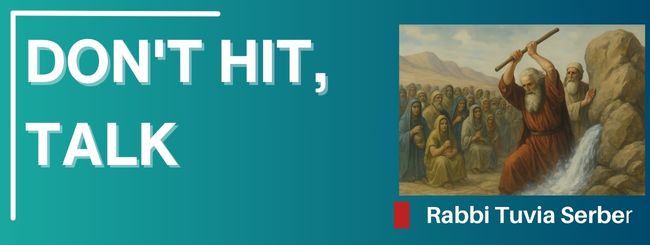בס”ד
Parashat Chukat In this week’s Torah reading we find the story of Moshe hitting the stone to give water. A psychological approach to understand a fundamental lesson in leadership.
This Week’s Torah Portion: Chukat – Irrational Laws and Leadership Lessons
This week’s Torah portion is called Chukat, which refers to “irrational laws”—commandments that are difficult to fully understand. Many events take place in this portion, and interestingly, most of them occur toward the end of the Jewish people’s journey through the desert. In fact, nearly 38 years pass in just a few verses.
One of the significant stories that happens after these 38 years—almost 40 years of wandering—is that the Jewish people suddenly have no water. Why? Because Miriam, the sister of Moshe Rabbeinu (Moses), passes away. The miraculous well that had accompanied the Jewish people throughout their journey in the desert was there in Miriam’s merit. When she died, the well disappeared.
So, the people complained to Moshe Rabbeinu, saying they needed water. Moshe, in turn, turned to G-d. And G-d told him the following (paraphrased from the original Hebrew):
“You and your brother Aharon shall speak to the stone, and it will give forth water…”
However, Moshe Rabbeinu was upset, and we see here one of the dangerous consequences of anger. In Judaism, anger is considered a very negative trait—something lowly and destructive. In his frustration, Moshe gathered the people and, instead of speaking to the stone as instructed, he struck it—not once, but twice. Water came out, the people drank, and everything seemed fine on the surface.
But G-d was not pleased with Moshe’s actions. He said to Moshe and Aharon:
“Because you did not believe in Me, to sanctify Me before the eyes of the Children of Israel, you shall not bring this congregation into the Land that I have given them.”
In other words, because Moshe hit the stone instead of speaking to it, he and Aharon were not allowed to lead the people into the Land of Israel. They would die outside the Land.
Let’s try to analyze this deeper. Why did Moshe hit the stone when G-d clearly told him to speak to it? The simple answer is: he was angry. And when you are angry, you make mistakes. That in itself is already a powerful lesson—beware of anger.
But perhaps there’s a deeper psychological explanation. Moshe knew his people. He had dealt with the generation that came out of Egypt 40 years earlier. They were a tough generation—constantly complaining, rebelling, and challenging leadership. That generation needed strong, forceful leadership. In fact, 40 years earlier, when the people needed water, G-d told Moshe to hit the rock—and he did, and it worked. No one complained then, and G-d didn’t object.
However, now 40 years have passed. That older generation—the men between ages 20 and 60 who had left Egypt—had all died. This new group of Israelites was different. But Moshe may have seen them as the same. He assumed they still needed to be led with toughness, “with a stick,” so to speak. That’s why he reverted to the same method: he hit the rock again.
But this time, G-d was saying something else:
“No. These are not the same people. They need a different kind of leadership—a leadership based on words, not force.”
Moshe failed to recognize this shift. He didn’t update his leadership style for the new generation. That’s why he was no longer the right person to lead the people into the Land of Israel.
There is a deep and timeless lesson here. Generations change. Education must adapt. People evolve, and leadership must evolve with them. What worked for one generation may not work for the next. In our times, too, we must learn to lead, teach, and inspire not by “hitting the rock,” but by speaking—by understanding, listening, and connecting through words.
Talk from Rabbi Tuvia Serber
The above is a representation of the spoken text converted to written text.
© Copyright, all rights reserved. If you enjoyed this article, we encourage you to distribute it further.
Our blogs may contain text/quotes/references/links that include copyright material of
Mechon-Mamre.org, Aish.com, Sefaria.org, Chabad.org, and/or AskNoah.org, which we use in accordance with their policies.
